For most of us, the idea of a construction site conjures up images of cranes, jackhammers, and hardhats. And while those things are pervasive for a reason, the modern construction site has become a place where the most valuable assets often go unseen. That is, a technological infrastructure shaped for the unique demands of this industry, catering to a project-based workflow, high distribution across job sites, and frequent employee collaboration.
More than ever, construction companies are recognizing the value of integrated construction IT services to support their clients and employees. Of course, within the range of leveraged resources, there is immense variety. J.B. Knowledge, a leader in tech solutions for both construction and insurance industries, recently released its 6th annual "Construction Technology Report." Their researchers explored the technical variation across construction professionals, pulling from 1,974 domestic and international participants.
Here are the Most Eye-Opening Things We Read:
Construction Industry Slow to Incorporate IT Solutions
Historically, the adoption of specialized tools by construction companies has been something of an uphill battle. J.B. Knowledge reaffirmed, in their 2017 findings, that construction is still the slowest industry to incorporate IT solutions. However, this year has shown some overarching improvements. Compared to 2016:
- There was a general increase in both IT spending, and designated IT staff
- Fewer companies have an IT budget of 1-2%
- Fewer companies reported not knowing the percentage spent on IT
- More companies have an IT budget of 3% or more
- There were higher reported levels of confidence when trying new technologies
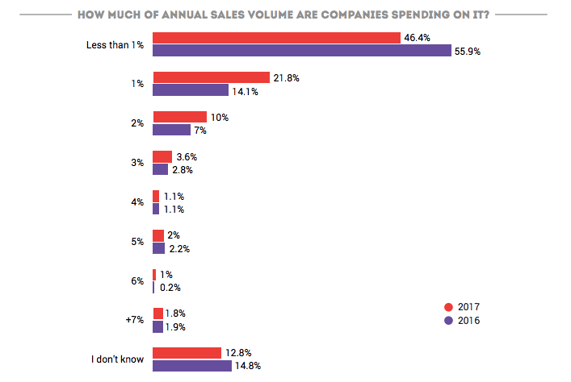
In general, more companies are "realizing the value of dedicating funds to IT and recognizing the need to plan for technology upgrades." This is especially important, as the construction industry continues to diversify in terms of projects and staffing needs. Of survey respondents, occupations included: general contractor, construction technology provider, construction services provider, architectural/engineering/design firms, and subcontractors
Looking at the breakdown, it is worth noting the limited presence of IT specialists. As reported:
- 30.1% of companies are outsourcing a portion of their IT; 19.5% have fully outsourced
- Many large construction companies set a budget threshold of $20 million - above which, they will pay for dedicated in-house IT staff
- The highest ranking IT staff are currently: IT Manager / Specialist, CIO, Director, VP of IT, then VP
Construction Technologist
In recent years, there has been growing interest in the position of "Construction Technologist". The construction technologist is something of a hybrid specialist, combining IT, construction, and business goals, to position their employers for long-term success. Not only do construction technologists centralize and manage priorities, they can act as the liaison between their company and a managed service provider, if their organization has chosen to hybridize or outsource IT needs. Construction technologists also alleviate the pressure placed on staff who are trying to balance IT and other responsibilities. In many cases, J.B. Knowledge analysts found that "those working on IT are shared resources with conflicting priorities - and one of their responsibilities, either their day job or their IT duties, will suffer."
- At present, 21.9% of respondents have a "staff with IT responsibilities but not a dedicated department"
In lieu of these technologists, the responsibility over IT staff often falls to another managerial position, with limited IT experience. Unfortunately, this disconnect between specialty and oversight can prove a lasting hindrance to the incorporation of new resources. Researchers noted:
- "Management reluctance" is the largest growing limiting factor, when it comes to adopting new technology
- Lack of IT staff, lack of IT experience, maturity of systems, and budget also pose significant limiting factors to new tech
Beyond the adoption of new products, a lack of managerial expertise also hampers the quality of data security.
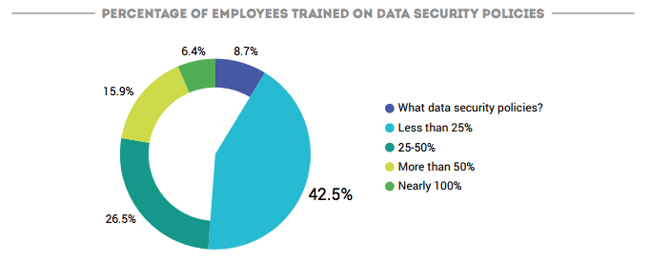
Tip: Cybersecurity training doesn't have to be a struggle - here are five ways to engage employees and secure your data.
As per the report's findings:
- While there has been a 15-20% increase in efforts to ensure data security and management (including employee training, mobile security, corporate IT policy, etc.), IT training is "not as prevalent as reported, or not fully implemented and monitored" as necessary to drive the successful incorporation of new technical resources
Data Security
As mobile and multi-purpose devices continue to carve out a place on the modern construction site, there will have to be greater consideration for data security. Given the prevalence of BYOD policies, the blurring of personal and corporate data, as well as the treatment of hardware and software, must become a key issue for construction-based IT employees.
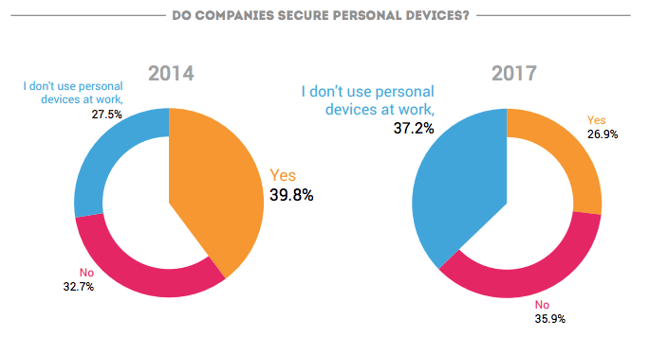
Tip: The most efficient workforce is a mobile one - here is a quick guide to securing company data, across all devices.
J.B. Knowledge also observed a considerable shift in the adoption rates for both software and workflow solutions. Looking first at software:
- Rates of enactment continued to decline in 2017
There are a few possible reasons for this decrease. The first is that popular solutions may be supporting more features, rendering additional software redundant. It may also be that contractors are still seriously underestimating the importance of IT integration. Or, it is possible that respondents trimmed down their tech tools due to budgetary or implementation constraints.
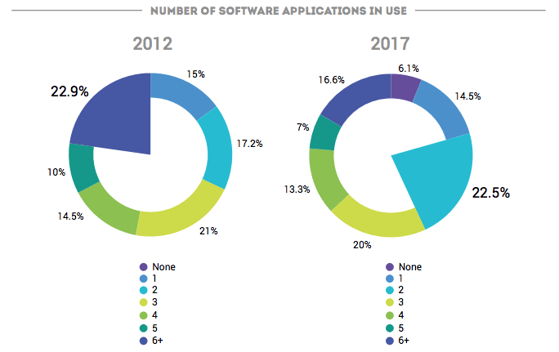
Regardless of the reason, it was observed that these "solutions are being adopted at the departmental level, without considering how the data enters and leaves the department." Again, this points to a disconnect between the purchasers of IT solutions, and the employees who actually use them.
From a workflow perspective, "Accounting" and "Project Management" software are currently the most commonly adopted by construction companies. Despite the growing prevalence of digitized workflows, many businesses are still relying on a combination of spreadsheets and software. This duplication often results in lost time, efficiency, and increased risk of data loss or corruption. As companies mature and update processes, these digital workflows should predominate, eliminating further redundancies.
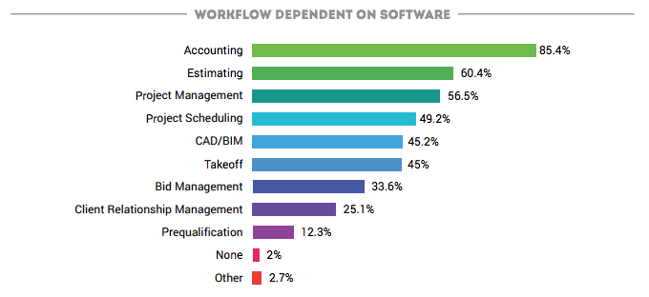
As clearly articulated in J.B. Knowledge's findings, industry-minded technology is an invaluable asset to the modern construction company. The scope of these tailored resources continues to expand, improving:
- user mobility
- employee collaboration
- real time feedback and project management
- data backups and security across all devices
Construction companies across the Northeast are catching on to the business benefits of outsourced IT. Watch the video below to learn how iCorps has been able to scale with Windover Construction in Massachusetts.
For an industry like construction, technology and long-term IT planning can no longer be an afterthought. By leveraging the benefits of iCorps' outsourced and hybridized IT, your company can focus on what really matters - a quality product and business longevity. For more information, contact an iCorps expert today.





